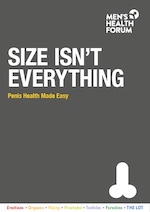Know Your Knob: all our penis health links
Testosterone FAQs
Is testosterone made in the testicles?
Yes. Testosterone is the most important of the male hormones. (The ovaries produce it in lower levels in women.)
It is responsible for muscle, bone and sexual development as well as sex drive. At puberty, it makes makes the voice drop and the penis, testicles and facial and pubic hair grow.
In the prostate gland, testosterone is broken down into the related hormone dihydro-testosterone which appears to be involved in baldness and enlarged prostate.
Testosterone levels fall slightly with age. Some men - particularly those with high levels to begin with - can effectively have half as much testosterone in their blood at 80 as at 20. It may lead to loss of muscle tone and bone strength and an increase in weight and the risk of heart disease and diabetes.
Whether reduced testosterone is also the cause of the sluggishness, loss of libido and depression that some middle-aged men experience is debateable but it is worth thinking about. Testosterone replacement therapy is available but, while trials continue, many doctors are sceptical.
Can you boost testosterone levels naturally?
Yes. Taking more exercise and having more sex gets the hormones going. Also fat reduces the amount of testosterone available to the body so losing weight and cutting down on fatty foods and beer may help.
Vitamin and mineral deficiencies can worsen hormonal problems. Eat more seeds (particularly pumpkin and sunflower seeds), shellfish, beans, yoghurt and lean meat. These are high in zinc - the mineral essential for testosterone production. Ginseng, stinging nettles and the South American herb Muira Puama are also reputed to help.
Testosterone. That's what makes me a man, right? What do you mean 'produced in the ovaries'?
Testosterone makes you a man but it's also what makes a woman a woman. Testosterone is the main male hormone but, as the precursor to the female hormone oestrogen, it's essential to women too.
Gross. What happened to sugar and spice and all things nice?
Myth. Women are driven by testosterone just like men. Researchers revealed a new spray that was doing wonders for Australian women with low sex-drives. The active ingredient? Testosterone. An effective treatment for women with low libidos could be worth $1 billion.
So why doesn't their hair fall out? I thought that was testosterone.
Testosterone is broken down into dihydro-testosterone (which causes baldness) in the prostate, an organ which women don't have.
I've got a friend who thinks low testosterone levels cause erection problems.
No, you're OK. I mean, he's OK. Testosterone levels fall slightly with age but they're very rarely the cause of erectile dysfunction.
What do lower levels cause?
As we said, some men have effectively half as much testosterone in their blood at 80 as at 20. It may reduce muscle and bone strength and increase weight and the risk of heart disease and diabetes.
Is it a good idea to take testosterone?
No. Unless you have been prescribed them by a doctor, testosterone replacement therapy (TRT) can be very dangerous. The Food and Drug Administration (FDA) in the USA found that men who took TRT were at increased risk of heart attacks. Sometimes a doctor may feel it is necessary to increase your level of testosterone. This is the case in some conditions such as Hypogonadism where your body isn't producing enough testosterone and also Klinefelter's syndrome. When presribed men are given Testosterone enantate which acts very similarly to the testosterone we make in our bodies.
We don't currently post comments online but are always keen to hear your feedback.
Date published
07/04/14
Date of last review
07/04/14
Date of next review
07/04/17
References
|
The Men’s Health Forum need your support It’s tough for men to ask for help but if you don’t ask when you need it, things generally only get worse. So we’re asking. In the UK, one man in five dies before the age of 65. If we had health policies and services that better reflected the needs of the whole population, it might not be like that. But it is. Policies and services and indeed men have been like this for a long time and they don’t change overnight just because we want them to. It’s true that the UK’s men don’t have it bad compared to some other groups. We’re not asking you to ‘feel sorry’ for men or put them first. We’re talking here about something more complicated, something that falls outside the traditional charity fund-raising model of ‘doing something for those less fortunate than ourselves’. That model raises money but it seldom changes much. We’re talking about changing the way we look at the world. There is nothing inevitable about premature male death. Services accessible to all, a population better informed. These would benefit everyone - rich and poor, young and old, male and female - and that’s what we’re campaigning for. We’re not asking you to look at images of pity, we’re just asking you to look around at the society you live in, at the men you know and at the families with sons, fathers and grandads missing. Here’s our fund-raising page - please chip in if you can. |



